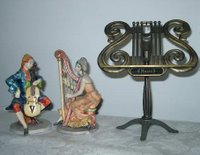Mozart Divas of his Day
Mozart collaborated with Lorenzo Da Ponte in three of his greatest operas – Le Nozze di Figaro, Don Giovanni and Così fan tutte - and the last one in 1791, Die Zauberflöte, with Emanuel Schikaneder.
Catarina Cavalieri
Catarina Cavalieri (1760-1801) was born in Vienna. She made her debut in 1775 and was one of the finest singers of her day, especially in German opera. She was renowned for her fioratura abilities. Mozart wrote memorable music for Cavalieri. She played the role of Constanze in Mozart's Die Entführung aus dem Serail (1782) and sang Donna Elvira in the premiére of Don Giovanni in 1788.
Adriana Ferraresi del Bene
Adriana Ferraresi del Bene (c. 1760-after 1799) was an Italian soprano. She performed in London and most successfully, in Vienna, in 1788-1791, where she made her reputation singing serious roles in opera buffa. A mistress of Da Ponte, she created Fiordiligi in Così fan tutte (1790) and sang Susanna in the Vienna revival (1789) of Le nozze di Figaro, for which Mozart wrote her two new Arias. She was noted for her remarkable voice range.
Maria Anna Gottlieb
Anna Gottlieb (1774-1856) was born in Vienna, a singer and actress. Gottlieb was barely twelve when she played the role of Barbarina in Le Nozze di Figaro in 1786. She joined Schikaneder's Freihaus-Theater in 1789, and in 1791, became the original Pamina in Die Zauberflöte. Then she had a long and popular career in singspiel and comedies, retiring from the stage in 1828.
Aloysia (née Weber) Lange
Maria Aloysia Weber-Lange (c. 1761-1839) was born in Zell im Wiesenthal in the Black Forest of Germany, a German soprano known for her great expression. She was Mozart's sister-in-law for whom Mozart wrote concert arias. Mozart fell in love with her, but she did not return his affection. Among her other engagements, she became a leading singer of the Italian troupe. She also sang Konstanze in Mozart's Die Entführung aus dem Serail; occasionally, she sang for the Italian opera, notably in 1788, in the role of Donna Anna at the Viennese premiere of Don Giovanni. She died in Salzburg.
Josefa (née Weber) Hofer Mayer
Josefa (née Weber) Hofer Mayer (1758/9- 1819) was the oldest sister of Constanze Weber Mozart, wife of Mozart. A dramatic soprano, Mozart wrote the Queen of the Night role for her in Die Zauberflöte. She married Mozart's friend, violinist Franz de Paula Hofer. After he died, she remarried singer and actor Friedrich Sebastian Mayer, who also interpreted Mozart's music.
Luisa Laschi Mombelli
Luisa Laschi Mombelli (1760s - c.1789) was born in Florence, Italy. She came to Vienna in 1784. She was known to have an extraordinary wide range of roles. From 1784, she created the role of the Countess in Mozart's Le nozze di Figaro in 1786 and sang Zerlina in Vienna's first performance of Don Giovanni, in 1788.
Nancy Storace
Anna Selina Nancy Storace (1765-1817) was born in London, the sister of composer Stephen Storace. She began her operatic career in Italy but moved in 1783 to Vienna, where she married English composer J.A. Fisher. A gifted comic singer, Viennese audiences adored her lighter and simpler repertoire. She played the role of Susanna in Mozart's Le nozze di Figaro in 1786. Later she sang in her brother's works in London and toured Europe with the tenor John Braham, with whom she lived until 1816.
Louise Villeneuve
Louise Villeneuve (fl. 1771 - 1799) was the original Dorabella in Così fan tutte in 1790. It appeared that she started as a dancer. She joined the opera company in Vienna in 1789, making her debut as Amore in Martin y Soler's L'arbore di Diana, a role which gained her immediate success. Mozart also supplied arias for her in Cimarosa's I due baroni, (K578) and Martin's Il burbero di buon cuore (K582, K583). She left Vienna at the end of the 1790-1791 season to resume a career in Italy.
Resources:
The Cambridge Mozart Encyclopedia, edited by Cliff Eisen and Simon P. Keefe, Cambridge UP, 2007
The Grove Dictionary of Music and Musicians, 2nd Edition, edited by Stanley Sadie, Macmillan, 2000
The Oxford Companion to Music, edited by Alison Latham, 2002
Read more at Suite.IO:
Mozart's Divas of His Day





